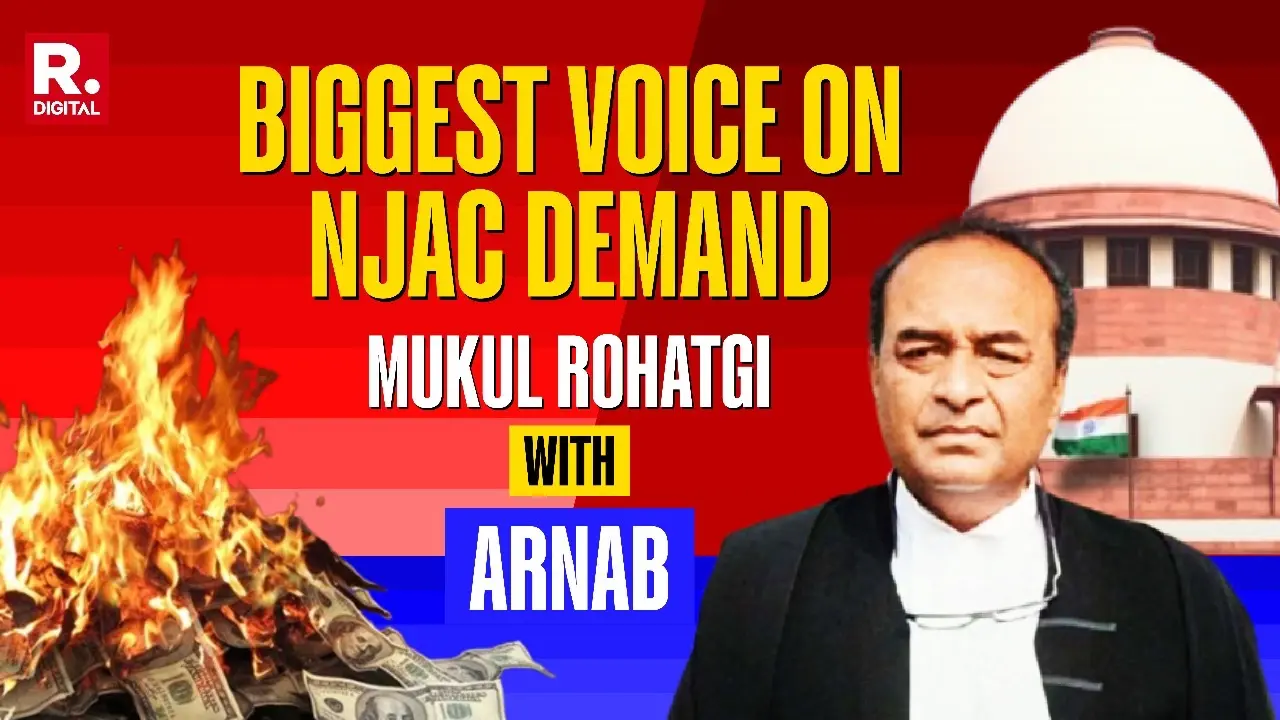Updated 25 March 2025 at 23:11 IST
Sunlight to Opacity: Mukul Rohatgi On Why NJAC Can Be A Step Towards Judicial Accountability
Defending the NJAC, which was struck down by the Supreme Court in 2015, Rohatgi said its purpose was to bring transparency into the opaque collegium system.
- India News
- 4 min read

New Delhi: The recent controversy surrounding Delhi High Court judge Justice Yashwant Varma, at whose residence a pile of burnt cash was discovered on Holi , has reignited discussions on judicial appointments and the scrapped National Judicial Appointments Commission (NJAC). Former Attorney General Mukul Rohatgi, speaking exclusively to Republic Media Network's Editor-in-Chief Arnab Goswami , stressed the urgent need for judicial reforms and greater transparency in the appointment of judges.
Rohatgi: Judicial Appointments Must Have Transparency
When asked whether the cash scam at the High Court judge's residence revives the need to bring back the idea (NJAC), Rohatgi refrained from commenting on the judge’s guilt or innocence, stating that a committee is currently investigating the matter. However, he provided historical context on judicial appointments in India.
He explained, "When the Constitution was framed, the power to appoint judges was given to the government and not to the Chief Justice. As Dr. B.R. Ambedkar said during the Constituent Assembly debates, ‘absolute power cannot be given to one individual because he is an ordinary mortal like others, otherwise it will become an imperium in imperio (a government within a government).’ That is why, in 1950, the power was vested in the government, as it is a collective body and not one individual."
He elaborated that the system functioned effectively until 1975, till the Emergency rocked the boat. Subsequently, in a judicial shift, the Supreme Court took over the power of judicial appointments, interpreting the constitutional phrase "consultation with the Chief Justice" to mean "concurrence with the Chief Justice."
Advertisement
"I am baffled by this interpretation because the meanings of ‘consultation’ and ‘concurrence’ are well known," Rohatgi stated, criticising how the judiciary consolidated appointment powers.
Opaque Appointment Process Needs Reform
Rohatgi condemned the current system as lacking transparency, highlighting that judicial appointments are made behind closed doors. "A body of three or five judges sits in a closed room. Nobody knows where the inputs come from, how they are debated, or what outside checks exist. The bar is not consulted, yet the bar is the best barometer of judges' performance. The Supreme Court has no real knowledge of how a lawyer in Odisha is working; it relies on third-party information of unknown credibility."
Advertisement
NJAC: An Attempt to Bring ‘Sunlight’ into the Process
Defending the NJAC, which was struck down by the Supreme Court in 2015, Rohatgi said its purpose was to bring transparency into the opaque collegium system.
"As Arun Jaitley had said, NJAC was meant to bring ‘sunlight’ into the process. It included a majority of the government, a majority of judges, one law minister, and possibly a distinguished jurist. I don't understand what was wrong with that."
He criticized the Supreme Court’s decision to strike down NJAC, calling it "an extremely flawed judgment" and stating that the judiciary was reluctant to relinquish power.
"I cited examples from over two dozen countries, including in the West, where judges do not appoint judges. But here, a small group decided to override the Constitution."
‘Will of the People Lies in Parliament’
Rohatgi argued that the appointment of judges should reflect the will of the people, which is expressed through Parliament.
"The will of the people is reflected in Parliament, not in judicial appointments. MPs are elected and accountable to the public, whereas judges are not chosen through a democratic process. The Constitution provided that the government, in consultation with the Chief Justice, should appoint judges. This system worked well from 1950 to 1975 until the Emergency changed everything. It should have returned to normalcy, but it never did."
He, without mincing any words, stated that no individual or institution is above the Constitution. "Changing the Constitution through a bench of judges rather than through Parliament is an illegal method. It can only be changed by a two-thirds majority in Parliament."
Rohatgi on Justice Varma Controversy: ‘A Murder Case Without a Body’
Commenting on the cash scam linked to Justice Yashwant Varma, Rohatgi strongly criticised the handling of the case, drawing an analogy to a criminal investigation. "The first thing investigators should have done was seize the material and be in touch with the Chief Justice of India or the Chief Justice of the High Court. But by the next morning, nothing was available. It’s like a murder case without a body."
He pointed out gaps in evidence collection, questioning the validity of the video evidence. "Who can confirm where this video was recorded? What proof exists that the room shown is the judge’s? What happened to the primary material? Are the notes real or fake? Are they just monopoly money? Without proper forensic investigation, this case will be a criminal lawyer’s delight, as many questions remain unanswered."
WATCH MUKUL ROHATGI's FULL INTERVIEW WITH ARNAB BELOW:-
Get Current Updates on India News, Entertainment News, Cricket News along with Latest News and Web Stories from India and around the world.
Published By : Surabhi Shaurya
Published On: 25 March 2025 at 22:25 IST
